Unit 1Where did you go on vacation Section A Grammar Focus-3C课件(共53张PPT)人教版八年级上册
文档属性
| 名称 | Unit 1Where did you go on vacation Section A Grammar Focus-3C课件(共53张PPT)人教版八年级上册 | 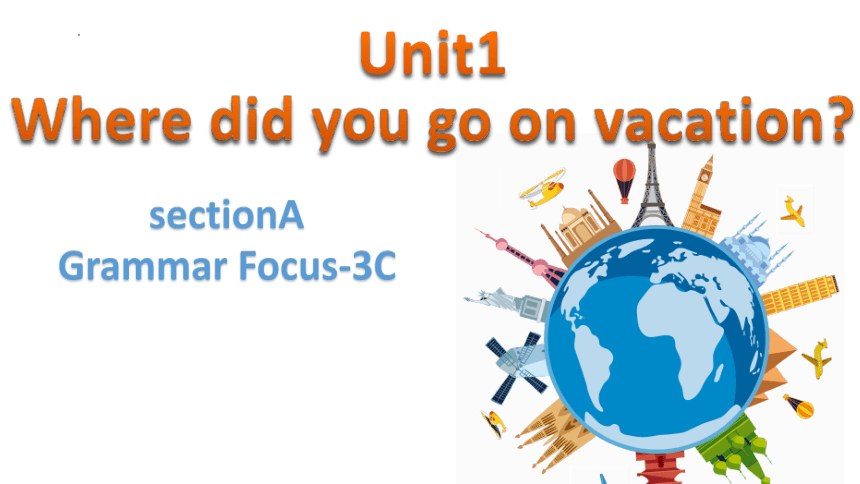 | |
| 格式 | pptx | ||
| 文件大小 | 30.6MB | ||
| 资源类型 | 教案 | ||
| 版本资源 | 人教新目标(Go for it)版 | ||
| 科目 | 英语 | ||
| 更新时间 | 2024-09-01 18:57:51 | ||
图片预览

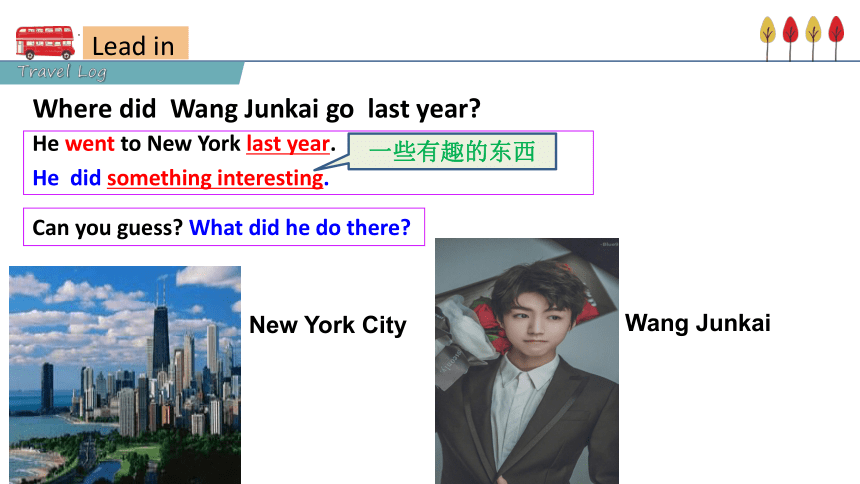


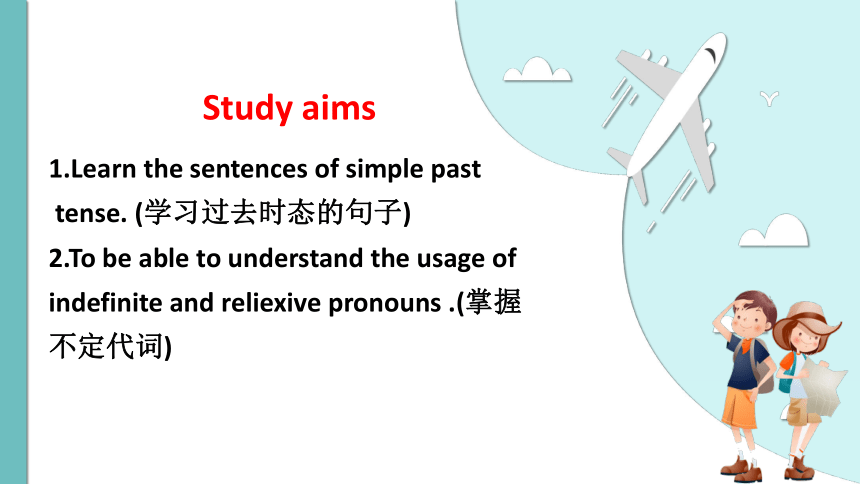


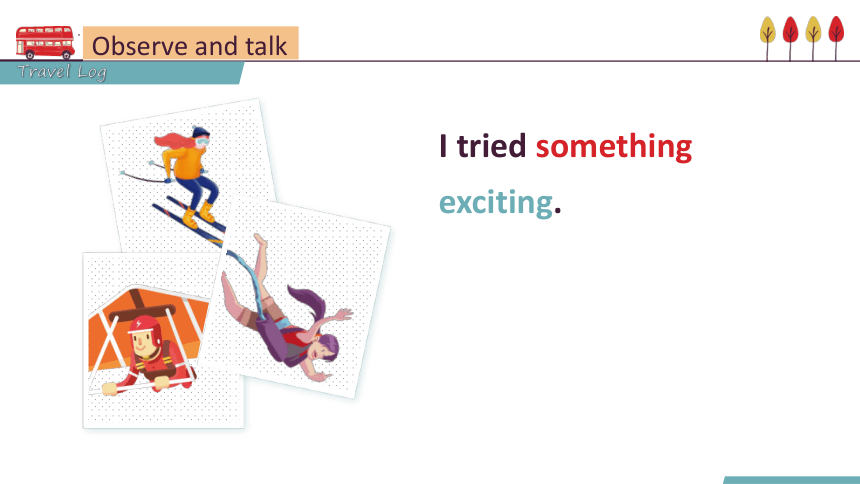

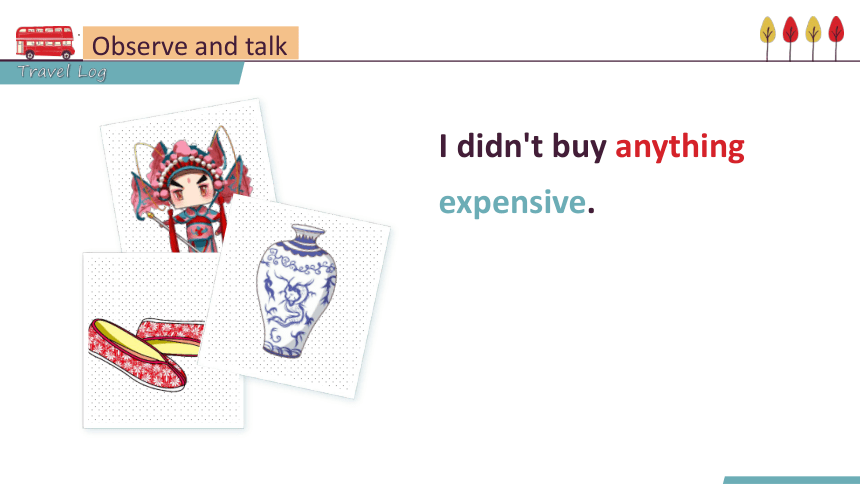
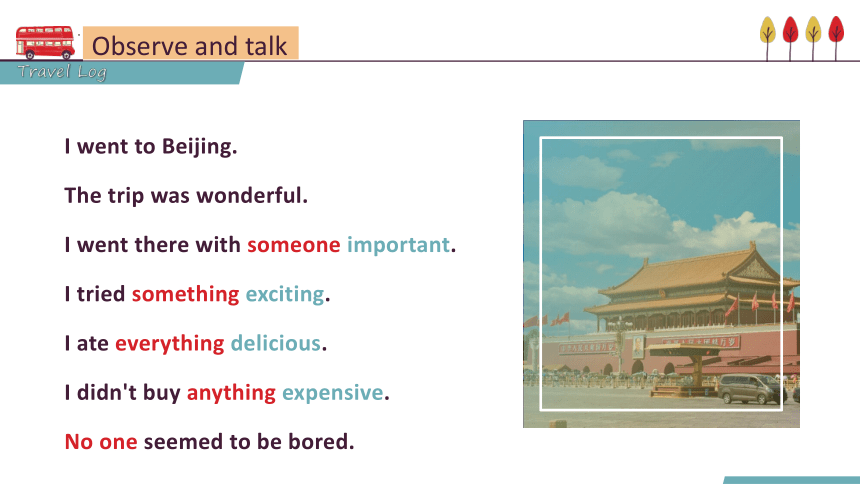
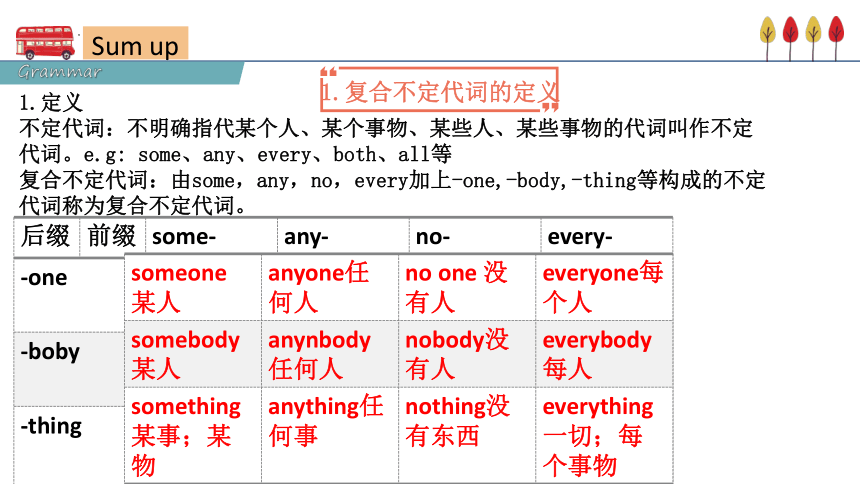
文档简介
(共53张PPT)
Where did you go on vacation
sectionA
Grammar Focus-3C
Unit1
He went to New York last year.
He did something interesting.
New York City
Wang Junkai
Can you guess What did he do there
Where did Wang Junkai go last year
一些有趣的东西
Travel Log
Lead in
He bought something special.
After the park, he went to a gift shop.
Did he go with anyone
He went to Central Park.
Yes, he went there with his friends.
任何一个人
一些有趣的东西
Travel Log
Lead in
After the gift shop,
he was very hungry, then he
_____________.
went to the KFC
(动词原形 go)
ate some ice cream
(动词原形 eat)
had a hamburger
(动词原形 have)
Then he _________________
and _____________________.
Travel Log
Lead in
1.Learn the sentences of simple past
tense. (学习过去时态的句子)
2.To be able to understand the usage of indefinite and reliexive pronouns .(掌握不定代词)
Study aims
I went to Beijing.
The trip was wonderful.
Observe and talk
Travel Log
I went there with someone important.
Travel Log
Observe and talk
I tried something exciting.
Travel Log
Observe and talk
I ate everything delicious.
Travel Log
Observe and talk
I didn't buy anything expensive.
Travel Log
Observe and talk
Let's think and guess.
I went to Beijing.
The trip was wonderful.
I went there with someone important.
I tried something exciting.
I ate everything delicious.
I didn't buy anything expensive.
No one seemed to be bored.
Travel Log
Observe and talk
1.复合不定代词的定义
1.定义
不定代词:不明确指代某个人、某个事物、某些人、某些事物的代词叫作不定代词。e.g: some、any、every、both、all等
复合不定代词:由some,any,no,every加上-one,-body,-thing等构成的不定代词称为复合不定代词。
后缀 前缀 some- any- no- every-
-one
-boby
-thing
someone 某人 anyone任何人 no one 没有人 everyone每个人
somebody某人 anynbody任何人 nobody没有人 everybody每人
something某事;某物 anything任何事 nothing没有东西 everything一切;每个事物
Sum up
Grammar
Grammar
I did something fun on my vacation.
I didn’t go there with my husband.
I went there with someone else.
Everything was excellent.
I visited some places of interest.
I ate everything I like.
I bought nothing for myself
but something for my parents
because I didn’t see anything I liked.
1. Underline words like something.
Sum up
Grammar
I did something fun on my vacation.
I didn’t go there with my husband.
I went there with someone else.
Everything was excellent.
I visited some places of interest.
I ate everything I like.
I bought nothing for myself
but something for my parents
because I didn’t see anything I liked.
1. Underline words like something.
2. Something special
规则一 形容词后置
Sum up
Grammar
I did something fun on my vacation.
I didn’t go there with my husband.
I went there with someone else.
Everything was excellent.
I visited some places of interest.
I ate everything I like.
I bought nothing for myself
but something for my parents
because I didn’t see anything I liked.
1. Underline words like something.
2. Something special
规则一 形容词后置
规则二 谓语动词用单数
Sum up
Grammar
I did something fun on my vacation.
I didn’t go there with my husband.
I went there with someone else.
Everything was excellent.
I visited some places of interest.
I ate everything I like.
I bought nothing for myself
but something for my parents
because I didn’t see anything I liked.
1. Underline words like something.
2. Something special
规则一 形容词后置
规则二 谓语动词用单数
规则三 一般疑问句和否定句
something变anything
Sum up
Where did you go on vacation I went to New York City.
Did you go out with anyone No. No one was here. Everyone was on vacation.
Did you buy anything special Yes, I bought something for my father.
No, I bought nothing.
How was the food Everything tasted really good!
Did everyone have a good time Oh, yes. Everything was excellent.
Read the sentences of Grammar focus together. (齐读grammar focus里面的句子)
Fill in the following blanks according to the sentences.(根据句子填空)
1.不定代词作主语时,当作_____(单数/复数)来看;2.肯定句用________________________________;
3.疑问句用_________________________________;
4.____________________________本身带有否定。
someone, something, everyone,everything
anyone, anything
no one, nothing
单数
(1) 作主语时谓语要用单数形式。
例: 没有什么东西是困难的。
Nothing ______(be) difficult.
在教室里没有人。
There ___ (be) no one/ nobody in the classroom.
某个人在教室吃东西。
Somebody ______(eat) in the classroom
is
is
eats
复合不定代词的用法汇总
Sum up
Grammar
(2)不定代词被形容词修饰时,它们必须放在形容词之前,即“不定代词+形容词”。
例:There is nothing wrong with the machine.
这台机器没有问题。
我想买一些特别的东西。
I want to buy_______ ________.
我想去一些有趣的地方。
I want to go _______ _______.
something special
somewhere interesting
Grammar
Sum up
(3)带some的复合不定代词常用于肯定句中;
带any的复合不定代词常用于否定句或疑问句中。
Someone called her last week. 某个人上周给她打电话了。
I'd like something to eat. 我想要一些吃的。
There isn’t anyone else there. 那没有 人。
Is anybody over there 那边有人吗?
Grammar
Sum up
(4)在表示请求,邀请,建议等疑问句或希望得到对方
肯定答复的疑问句中,也用带some复合不定代词。
如:
Would you like something to eat? 要些吃的东西吗?
Could you give me something to eat 你能给我一些吃的吗?
Grammar
Sum up
( 5 )当anything表示“任何事(物),无论何事(物)”,anyone,anybody表示“无论谁,任何人”等意义时,它们也可以用于肯定句中。如:
Anything is OK. 什么都行。
Anybody knows the answer.任何人都知道答案。
Grammar
Sum up
some-(某) somebody someone something
any-(任何) anybody anyone anything
every-(每) everybody everyone everything
no-(没有) nobody no one nothing
带some的复合不定代词常用于肯定句中;带any的复合不定
代词常用于否定句或一般疑问句中
当形容词修饰不定代词时,应放在其后面
由some, any, no, every构成的复合不定代词作主语时,都作单数看待,其谓语动词用单数式。
用法二
用法一
用法三
Did you do anything special
We ate something delicious
She met someone interesting.
Everything was excellent.
复合不定代词总结
anyone something anything everything nothing
Linda: Did you do ________ fun on your vacation, Alice
Alice: Yes, I did. I went to Sanya.
Linda: How did you like it
Alice: Well, it was my first time there,
so ________ was really interesting.
Linda: Did you go with ________
Alice: Yes, I did. I went with my sister.
Linda: Did you go shopping
Alice: Of course! I bought ________ for my parents,
but ________ for myself.
Linda: Why didn’t you buy ________ for yourself
Alice: I didn’t really see ________ I liked.
anything
everything
something
nothing
anything
anything
anyone
Practice
一、用恰当的不定代词填空。
1. _________ found Mr. Li’s keys and gave them back to him yesterday.
2. ─Did you buy ___________special
─ No, I didn’t. I bought ___________ .
3._________ helped the little boy. He did it himself.
4. My watch doesn’t work. ___________ is wrong with it.
5. ─Hello, ___________!
─Hello, Mr. Smith!
6. ─How’s it going, Jack
─Great! ____________ is going well.
7. ─Did you go to the beach with ___________
─Yes. I went there with my cousin.
something, anyone, everything, anything, nothing, someone, no one, everyone
Someone
anything
nothing
No one
Something
everyone
Everything
anyone
Practice
二、单项选择
1. Everyone in my class ____talking about these activities.
A. is B. are C. has D. have
2. Did you buy ______for your parents
A. something special B. anything special
C. special something D. special anything
3.Would you like _________ to eat
A.anything B.nothing C.anything D.something
4. ___went hiking last weekend because of the bad weather.
A.Someone B.No one C.Everyone D.Nothing
★
★
★
★
Practice
三、完成句子
1. Did he go out with _______ (任何人)
2. They didn’t buy ________ ______ (特殊的东西) there yesterday.
3. Tell us __________ __________ (有趣的事情) about your vacation, Jenny.
4. I didn't buy anything yesterday.(改为同义句)
I _______ _________ yesterday.
5. 我的眼睛有些问题。
There _______ ________ wrong with my eyes.
anyone
anything special
something interesting
bought nothing
is something
Practice
Where did you go on vacation I went to New York City.
Did you go out with anyone No. No one was here. Everyone was on vacation.
Did you buy anything special Yes, I bought something for my father.
No, I bought nothing.
How was the food Everything tasted really good!
Did everyone have a good time Oh, yes. Everything was excellent.
Simple Past Tense (一般过去时)
1. 概念:一般过去时表示过去某个时间或某一段时间内发生的动作
或存在的状态,常和表示过去的时间状语连用。
2. 标志词:yesterday, last night/week, in 1990, two days ago等,如:
He got up at 6:30 yesterday.
I visited my grandparents last week.
3. 一般过去时也表示过去经常或反复发生的动作,常和often,
always等表示频度的时间状语连用。如:
He always went to work by bus last year.
构成规则 原形 过 去 式
一般在动词原形末尾加-ed work play worked/t/
played/d/
结尾是e的动词加-d hope live hoped/t/
lived/d/
末尾只有一个辅音字母的重读闭音节词,先双写这个辅音字母,再加-ed stop trip stopped/t/
tripped/t/
结尾是“辅音字母+y”的动词,先变“y”为“ i”再加-ed study worry studied/d/
worried/d/
规则动词过去式的构成
清念 /t/, 元浊/d/;
/t/ /d/ 之后念/Id/
start-started/id/ guide-guided/id/
work
worked
Fast Reaction!
dance
danced
carry
carried
want
wanted
need
needed
Fast Reaction!
use
used
stop
stopped
hurry
hurried
巧记不规则动词过去式
不规则过去式
①am _____ is _____ are______
do _____ go______ lie(躺)______
see_____ take ______ get________
have/has________make________
find___________
was
was
were
did
went
lay
saw
took
got
had
made
found
②过去式含有“a(o)ught”:
teach(教)________think(想)________
buy(买)_________bring(带来)_______
catch(抓住)_______fight(打架)_______
taught
thought
bought
brought
caught
fought
③含“ee”的去e末尾+t:
keep(保持)________sleep(睡)______
sweep(扫)________meet(遇见______
feel(感觉)_______leave(离开_______
末尾+t:
learn(学习)_______mean(意思是)_______
burn(燃烧)_______
kept
slept
swept
met
felt
left
learnt
meant
burnt
④过去式同原形:
cut(割)______ put(放)____let(让)___
set(设置)______hit(击打)______
read(读)_____ cost(花费)_____
hurt(伤害)____beat(战胜)_________
/red/
不规则动词过去式
⑤过去式把某个字母改成“a”
run______ give _____sing _____
sit______ swim______
ring_______begin______ come_____
eat ______ drink______
ran
gave
sang
sat
swam
rang
began
came
ate
drank
不规则动词过去式
⑥过去式把某个部分改成“o”
ride________ drive _______ write________win________ shine______
speak_______ break_______
wear ________bear________
rode
drove
wrote
won
shone
spoke
broke
wore
bore
不规则动词过去式
⑦过去式中含“ew”的:
know(知道)______draw(画)________
blow(吹)_______fly(飞) _______
throw(投掷)______★show(展示)________
knew
drew
blew
flew
threw
showed
不规则动词过去式
⑧其他:
tell_____sell______fall_____hold_____
send_____spend_____lend_____build____
can_______will_______shall________
say _____ pay ______ lay _________
told
sold
fell
held
sent
spent
lent
built
could
would
should
said
paid
laid
Fast Reaction
drew
draw
rode
ride
read
read
slept
sleep
Fast Reaction
sang
sing
did
do
cried
cry
drank
drink
I say ''is''. You say ''was''.
I say ''go'' . You say ''went''.
I say ''ride'' . You say ''rode''.
I say ''read'' . You say ''read''.
I say ''do'' . You say ''did''.
This plane is ready to fly!
Let's chant
句子类型 含be动词 实意动词
肯定句
否定句
一般疑问句
一般疑问句的肯定回答
一般疑问句的否定回答
他昨天在家。
Have a try
He was at home yesterday.
He wasn't at home yesterday.
Was he at home yesterday
Yes, he was.
No, he was not(wasn't).
她上周去了北京。
She went to Beijing last week.
She didn't go to Beijing last week.
Did she go to Beijing last week
Yes, she did.
No, she didn't.
be动词在一般现在时中有am,is,are三种形式,意为“是”,但在一般过去时中有was(单数)和were(复数).
实意动词(行为动词)按照动词过去时变化规则进行变化,但在一般疑问句中需用助动词did,后接动词原形。
1. I ________ an old friend when I ________ in the street last Wednesday.
A、met, walk B、met, was walking
C、was meeting, walked D、was meeting, was walking
2. We _______ the Great Wall three days ago.
A、didn't went to B、didn't go to C、weren't go to D、go to
3. — Where ______ you ______ on vacation
— I went to New York City.
A、did, go B、are, going C、will, go D、do, you
4. —What______in the office just now
—Oh, Dale lost his watch.
A、happens B、happened C、is happening D、happen
5. —Can I use your pen, Mike
—Sorry. I______to bring it here this morning.
A、forget B、forgot C、am forgetting D、will forget
平常做练习题时一定要将表示动词过去时的短语勾画出来,动词的不规则变化要多做题目才能更好的记忆!
3a
anyone
something
anything
everything
nothing
Linda: Did you do _________ fun on your vacation, Alice
Alice: Yes, I did. I went to Sanya.
Linda: How did you like it
Alice: Well, it was my first time there, so_________ was really interesting.
Linda: Did you do with ________
Alice: Yes, I did. I went with my sister.
Linda: Did you go shopping
Alice: Of course! I bought __________ for my parents, but _________ for myself.
Linda: Why didn’t you buy _________ for yourself
Alice: I didn’t really see__________ I liked.
anything
everything
anyone
something
nothing
anything
anything
Fill in the blanks with the words in the box and practice the conversation.
当然;自然。
Of course not. 当然不。
反身代词,我自己
反身代词,你自己
1.How did you like it?
=What do you think of it
你觉得它怎么样?
teach oneself自学
Eg: I teach myself English. 我自学英语。
learn..by oneself自学
I learn English by myself . 我自学英语。
enjoy oneself玩得高兴
They enjoyed themselves. 他们玩得很开心. (=They had a good time.)
by oneself独自;独立
She looks after her little sister by herself.她独自照顾她的妹妹。
help oneself to sth. 自取/自用...;随便吃...
You can help yourself (to eat/drink) .
anything, everything, nothing, everyone, no one
Fill in the blanks in the e-mail message with the words in the box.
Dear Bill,
How was your vacation Did you do ________ interesting Did _______ in the family go with you I went to a friend’s farm in the countryside with my family. __________ was great. We fed some hens and saw some baby pigs. They were so cute! The only problem was that there was _______ much to do in the evening but read. Still ______ seemed to be bored. Bye for now!
Mark
anything
anyone
你的假期怎么样了?
在农村
3b
Everything
nothing
no one
似乎很无聊
... nothing but to do sth. 某人除了某事之外什么也没...。
此处的but表示“除了”,前有实义动词do时but后的不定式需省略to
Eg: I do nothing but play on the phone.
我除了玩手机什么也没干。
Eg: My teacher tells me nothing but to keep on.
我的老师除了对我说坚持,其他什么都没说。
1. ...there was nothing much to do in the evening but read.
Language Points.
seem[si m] v.好像;似乎;看来, 常见搭配有:
(1) 主语+seem+形容词 ... 看起来好像
Eg: She seemed sad.
(2) seem to do sth 似乎要做某事
Eg: She seemed to be sad.
(3) It seems that+从句 似乎...
Eg: It seemed that she was sad.
2. Still no one seemed to be bore.
Language Points.
Ask your group questions about their last vacation. Then tell the class your results.
3c
Did you… Everyone Someone(write the classmate’s name) No one
eat anything at a restaurant
read anything interesting
visit anyone in your family
buy anything?
keep a diary
In our group, everyone ate something at a restaurant…
This summer, I went to_______with my friends on my vacation. It was_______ in _____.
We went to _______ and it was beautiful.We also visited _______ I liked this place because I learned something important. _______ were really friendly and they helped us a lot. We ate _______. Food in _____ was delicious.
All in all, it was a/an ________ vacation. You should go there someday.
Show Time
Where did you go on vacation
sectionA
Grammar Focus-3C
Unit1
He went to New York last year.
He did something interesting.
New York City
Wang Junkai
Can you guess What did he do there
Where did Wang Junkai go last year
一些有趣的东西
Travel Log
Lead in
He bought something special.
After the park, he went to a gift shop.
Did he go with anyone
He went to Central Park.
Yes, he went there with his friends.
任何一个人
一些有趣的东西
Travel Log
Lead in
After the gift shop,
he was very hungry, then he
_____________.
went to the KFC
(动词原形 go)
ate some ice cream
(动词原形 eat)
had a hamburger
(动词原形 have)
Then he _________________
and _____________________.
Travel Log
Lead in
1.Learn the sentences of simple past
tense. (学习过去时态的句子)
2.To be able to understand the usage of indefinite and reliexive pronouns .(掌握不定代词)
Study aims
I went to Beijing.
The trip was wonderful.
Observe and talk
Travel Log
I went there with someone important.
Travel Log
Observe and talk
I tried something exciting.
Travel Log
Observe and talk
I ate everything delicious.
Travel Log
Observe and talk
I didn't buy anything expensive.
Travel Log
Observe and talk
Let's think and guess.
I went to Beijing.
The trip was wonderful.
I went there with someone important.
I tried something exciting.
I ate everything delicious.
I didn't buy anything expensive.
No one seemed to be bored.
Travel Log
Observe and talk
1.复合不定代词的定义
1.定义
不定代词:不明确指代某个人、某个事物、某些人、某些事物的代词叫作不定代词。e.g: some、any、every、both、all等
复合不定代词:由some,any,no,every加上-one,-body,-thing等构成的不定代词称为复合不定代词。
后缀 前缀 some- any- no- every-
-one
-boby
-thing
someone 某人 anyone任何人 no one 没有人 everyone每个人
somebody某人 anynbody任何人 nobody没有人 everybody每人
something某事;某物 anything任何事 nothing没有东西 everything一切;每个事物
Sum up
Grammar
Grammar
I did something fun on my vacation.
I didn’t go there with my husband.
I went there with someone else.
Everything was excellent.
I visited some places of interest.
I ate everything I like.
I bought nothing for myself
but something for my parents
because I didn’t see anything I liked.
1. Underline words like something.
Sum up
Grammar
I did something fun on my vacation.
I didn’t go there with my husband.
I went there with someone else.
Everything was excellent.
I visited some places of interest.
I ate everything I like.
I bought nothing for myself
but something for my parents
because I didn’t see anything I liked.
1. Underline words like something.
2. Something special
规则一 形容词后置
Sum up
Grammar
I did something fun on my vacation.
I didn’t go there with my husband.
I went there with someone else.
Everything was excellent.
I visited some places of interest.
I ate everything I like.
I bought nothing for myself
but something for my parents
because I didn’t see anything I liked.
1. Underline words like something.
2. Something special
规则一 形容词后置
规则二 谓语动词用单数
Sum up
Grammar
I did something fun on my vacation.
I didn’t go there with my husband.
I went there with someone else.
Everything was excellent.
I visited some places of interest.
I ate everything I like.
I bought nothing for myself
but something for my parents
because I didn’t see anything I liked.
1. Underline words like something.
2. Something special
规则一 形容词后置
规则二 谓语动词用单数
规则三 一般疑问句和否定句
something变anything
Sum up
Where did you go on vacation I went to New York City.
Did you go out with anyone No. No one was here. Everyone was on vacation.
Did you buy anything special Yes, I bought something for my father.
No, I bought nothing.
How was the food Everything tasted really good!
Did everyone have a good time Oh, yes. Everything was excellent.
Read the sentences of Grammar focus together. (齐读grammar focus里面的句子)
Fill in the following blanks according to the sentences.(根据句子填空)
1.不定代词作主语时,当作_____(单数/复数)来看;2.肯定句用________________________________;
3.疑问句用_________________________________;
4.____________________________本身带有否定。
someone, something, everyone,everything
anyone, anything
no one, nothing
单数
(1) 作主语时谓语要用单数形式。
例: 没有什么东西是困难的。
Nothing ______(be) difficult.
在教室里没有人。
There ___ (be) no one/ nobody in the classroom.
某个人在教室吃东西。
Somebody ______(eat) in the classroom
is
is
eats
复合不定代词的用法汇总
Sum up
Grammar
(2)不定代词被形容词修饰时,它们必须放在形容词之前,即“不定代词+形容词”。
例:There is nothing wrong with the machine.
这台机器没有问题。
我想买一些特别的东西。
I want to buy_______ ________.
我想去一些有趣的地方。
I want to go _______ _______.
something special
somewhere interesting
Grammar
Sum up
(3)带some的复合不定代词常用于肯定句中;
带any的复合不定代词常用于否定句或疑问句中。
Someone called her last week. 某个人上周给她打电话了。
I'd like something to eat. 我想要一些吃的。
There isn’t anyone else there. 那没有 人。
Is anybody over there 那边有人吗?
Grammar
Sum up
(4)在表示请求,邀请,建议等疑问句或希望得到对方
肯定答复的疑问句中,也用带some复合不定代词。
如:
Would you like something to eat? 要些吃的东西吗?
Could you give me something to eat 你能给我一些吃的吗?
Grammar
Sum up
( 5 )当anything表示“任何事(物),无论何事(物)”,anyone,anybody表示“无论谁,任何人”等意义时,它们也可以用于肯定句中。如:
Anything is OK. 什么都行。
Anybody knows the answer.任何人都知道答案。
Grammar
Sum up
some-(某) somebody someone something
any-(任何) anybody anyone anything
every-(每) everybody everyone everything
no-(没有) nobody no one nothing
带some的复合不定代词常用于肯定句中;带any的复合不定
代词常用于否定句或一般疑问句中
当形容词修饰不定代词时,应放在其后面
由some, any, no, every构成的复合不定代词作主语时,都作单数看待,其谓语动词用单数式。
用法二
用法一
用法三
Did you do anything special
We ate something delicious
She met someone interesting.
Everything was excellent.
复合不定代词总结
anyone something anything everything nothing
Linda: Did you do ________ fun on your vacation, Alice
Alice: Yes, I did. I went to Sanya.
Linda: How did you like it
Alice: Well, it was my first time there,
so ________ was really interesting.
Linda: Did you go with ________
Alice: Yes, I did. I went with my sister.
Linda: Did you go shopping
Alice: Of course! I bought ________ for my parents,
but ________ for myself.
Linda: Why didn’t you buy ________ for yourself
Alice: I didn’t really see ________ I liked.
anything
everything
something
nothing
anything
anything
anyone
Practice
一、用恰当的不定代词填空。
1. _________ found Mr. Li’s keys and gave them back to him yesterday.
2. ─Did you buy ___________special
─ No, I didn’t. I bought ___________ .
3._________ helped the little boy. He did it himself.
4. My watch doesn’t work. ___________ is wrong with it.
5. ─Hello, ___________!
─Hello, Mr. Smith!
6. ─How’s it going, Jack
─Great! ____________ is going well.
7. ─Did you go to the beach with ___________
─Yes. I went there with my cousin.
something, anyone, everything, anything, nothing, someone, no one, everyone
Someone
anything
nothing
No one
Something
everyone
Everything
anyone
Practice
二、单项选择
1. Everyone in my class ____talking about these activities.
A. is B. are C. has D. have
2. Did you buy ______for your parents
A. something special B. anything special
C. special something D. special anything
3.Would you like _________ to eat
A.anything B.nothing C.anything D.something
4. ___went hiking last weekend because of the bad weather.
A.Someone B.No one C.Everyone D.Nothing
★
★
★
★
Practice
三、完成句子
1. Did he go out with _______ (任何人)
2. They didn’t buy ________ ______ (特殊的东西) there yesterday.
3. Tell us __________ __________ (有趣的事情) about your vacation, Jenny.
4. I didn't buy anything yesterday.(改为同义句)
I _______ _________ yesterday.
5. 我的眼睛有些问题。
There _______ ________ wrong with my eyes.
anyone
anything special
something interesting
bought nothing
is something
Practice
Where did you go on vacation I went to New York City.
Did you go out with anyone No. No one was here. Everyone was on vacation.
Did you buy anything special Yes, I bought something for my father.
No, I bought nothing.
How was the food Everything tasted really good!
Did everyone have a good time Oh, yes. Everything was excellent.
Simple Past Tense (一般过去时)
1. 概念:一般过去时表示过去某个时间或某一段时间内发生的动作
或存在的状态,常和表示过去的时间状语连用。
2. 标志词:yesterday, last night/week, in 1990, two days ago等,如:
He got up at 6:30 yesterday.
I visited my grandparents last week.
3. 一般过去时也表示过去经常或反复发生的动作,常和often,
always等表示频度的时间状语连用。如:
He always went to work by bus last year.
构成规则 原形 过 去 式
一般在动词原形末尾加-ed work play worked/t/
played/d/
结尾是e的动词加-d hope live hoped/t/
lived/d/
末尾只有一个辅音字母的重读闭音节词,先双写这个辅音字母,再加-ed stop trip stopped/t/
tripped/t/
结尾是“辅音字母+y”的动词,先变“y”为“ i”再加-ed study worry studied/d/
worried/d/
规则动词过去式的构成
清念 /t/, 元浊/d/;
/t/ /d/ 之后念/Id/
start-started/id/ guide-guided/id/
work
worked
Fast Reaction!
dance
danced
carry
carried
want
wanted
need
needed
Fast Reaction!
use
used
stop
stopped
hurry
hurried
巧记不规则动词过去式
不规则过去式
①am _____ is _____ are______
do _____ go______ lie(躺)______
see_____ take ______ get________
have/has________make________
find___________
was
was
were
did
went
lay
saw
took
got
had
made
found
②过去式含有“a(o)ught”:
teach(教)________think(想)________
buy(买)_________bring(带来)_______
catch(抓住)_______fight(打架)_______
taught
thought
bought
brought
caught
fought
③含“ee”的去e末尾+t:
keep(保持)________sleep(睡)______
sweep(扫)________meet(遇见______
feel(感觉)_______leave(离开_______
末尾+t:
learn(学习)_______mean(意思是)_______
burn(燃烧)_______
kept
slept
swept
met
felt
left
learnt
meant
burnt
④过去式同原形:
cut(割)______ put(放)____let(让)___
set(设置)______hit(击打)______
read(读)_____ cost(花费)_____
hurt(伤害)____beat(战胜)_________
/red/
不规则动词过去式
⑤过去式把某个字母改成“a”
run______ give _____sing _____
sit______ swim______
ring_______begin______ come_____
eat ______ drink______
ran
gave
sang
sat
swam
rang
began
came
ate
drank
不规则动词过去式
⑥过去式把某个部分改成“o”
ride________ drive _______ write________win________ shine______
speak_______ break_______
wear ________bear________
rode
drove
wrote
won
shone
spoke
broke
wore
bore
不规则动词过去式
⑦过去式中含“ew”的:
know(知道)______draw(画)________
blow(吹)_______fly(飞) _______
throw(投掷)______★show(展示)________
knew
drew
blew
flew
threw
showed
不规则动词过去式
⑧其他:
tell_____sell______fall_____hold_____
send_____spend_____lend_____build____
can_______will_______shall________
say _____ pay ______ lay _________
told
sold
fell
held
sent
spent
lent
built
could
would
should
said
paid
laid
Fast Reaction
drew
draw
rode
ride
read
read
slept
sleep
Fast Reaction
sang
sing
did
do
cried
cry
drank
drink
I say ''is''. You say ''was''.
I say ''go'' . You say ''went''.
I say ''ride'' . You say ''rode''.
I say ''read'' . You say ''read''.
I say ''do'' . You say ''did''.
This plane is ready to fly!
Let's chant
句子类型 含be动词 实意动词
肯定句
否定句
一般疑问句
一般疑问句的肯定回答
一般疑问句的否定回答
他昨天在家。
Have a try
He was at home yesterday.
He wasn't at home yesterday.
Was he at home yesterday
Yes, he was.
No, he was not(wasn't).
她上周去了北京。
She went to Beijing last week.
She didn't go to Beijing last week.
Did she go to Beijing last week
Yes, she did.
No, she didn't.
be动词在一般现在时中有am,is,are三种形式,意为“是”,但在一般过去时中有was(单数)和were(复数).
实意动词(行为动词)按照动词过去时变化规则进行变化,但在一般疑问句中需用助动词did,后接动词原形。
1. I ________ an old friend when I ________ in the street last Wednesday.
A、met, walk B、met, was walking
C、was meeting, walked D、was meeting, was walking
2. We _______ the Great Wall three days ago.
A、didn't went to B、didn't go to C、weren't go to D、go to
3. — Where ______ you ______ on vacation
— I went to New York City.
A、did, go B、are, going C、will, go D、do, you
4. —What______in the office just now
—Oh, Dale lost his watch.
A、happens B、happened C、is happening D、happen
5. —Can I use your pen, Mike
—Sorry. I______to bring it here this morning.
A、forget B、forgot C、am forgetting D、will forget
平常做练习题时一定要将表示动词过去时的短语勾画出来,动词的不规则变化要多做题目才能更好的记忆!
3a
anyone
something
anything
everything
nothing
Linda: Did you do _________ fun on your vacation, Alice
Alice: Yes, I did. I went to Sanya.
Linda: How did you like it
Alice: Well, it was my first time there, so_________ was really interesting.
Linda: Did you do with ________
Alice: Yes, I did. I went with my sister.
Linda: Did you go shopping
Alice: Of course! I bought __________ for my parents, but _________ for myself.
Linda: Why didn’t you buy _________ for yourself
Alice: I didn’t really see__________ I liked.
anything
everything
anyone
something
nothing
anything
anything
Fill in the blanks with the words in the box and practice the conversation.
当然;自然。
Of course not. 当然不。
反身代词,我自己
反身代词,你自己
1.How did you like it?
=What do you think of it
你觉得它怎么样?
teach oneself自学
Eg: I teach myself English. 我自学英语。
learn..by oneself自学
I learn English by myself . 我自学英语。
enjoy oneself玩得高兴
They enjoyed themselves. 他们玩得很开心. (=They had a good time.)
by oneself独自;独立
She looks after her little sister by herself.她独自照顾她的妹妹。
help oneself to sth. 自取/自用...;随便吃...
You can help yourself (to eat/drink) .
anything, everything, nothing, everyone, no one
Fill in the blanks in the e-mail message with the words in the box.
Dear Bill,
How was your vacation Did you do ________ interesting Did _______ in the family go with you I went to a friend’s farm in the countryside with my family. __________ was great. We fed some hens and saw some baby pigs. They were so cute! The only problem was that there was _______ much to do in the evening but read. Still ______ seemed to be bored. Bye for now!
Mark
anything
anyone
你的假期怎么样了?
在农村
3b
Everything
nothing
no one
似乎很无聊
... nothing but to do sth. 某人除了某事之外什么也没...。
此处的but表示“除了”,前有实义动词do时but后的不定式需省略to
Eg: I do nothing but play on the phone.
我除了玩手机什么也没干。
Eg: My teacher tells me nothing but to keep on.
我的老师除了对我说坚持,其他什么都没说。
1. ...there was nothing much to do in the evening but read.
Language Points.
seem[si m] v.好像;似乎;看来, 常见搭配有:
(1) 主语+seem+形容词 ... 看起来好像
Eg: She seemed sad.
(2) seem to do sth 似乎要做某事
Eg: She seemed to be sad.
(3) It seems that+从句 似乎...
Eg: It seemed that she was sad.
2. Still no one seemed to be bore.
Language Points.
Ask your group questions about their last vacation. Then tell the class your results.
3c
Did you… Everyone Someone(write the classmate’s name) No one
eat anything at a restaurant
read anything interesting
visit anyone in your family
buy anything?
keep a diary
In our group, everyone ate something at a restaurant…
This summer, I went to_______with my friends on my vacation. It was_______ in _____.
We went to _______ and it was beautiful.We also visited _______ I liked this place because I learned something important. _______ were really friendly and they helped us a lot. We ate _______. Food in _____ was delicious.
All in all, it was a/an ________ vacation. You should go there someday.
Show Time
同课章节目录
- Unit 1 Where did you go on vacation?
- Section A
- Section B
- Unit 2 How often do you exercise?
- Section A
- Section B
- Unit 3 I'm more outgoing than my sister.
- Section A
- Section B
- Unit 4 What's the best movie theater?
- Section A
- Section B
- Unit 5 Do you want to watch a game show?
- Section A
- Section B
- Unit 6 I'm going to study computer science.
- Section A
- Section B
- Unit 7 Will people have robots?
- Section A
- Section B
- Unit 8 How do you make a banana milk shake?
- Section A
- Section B
- Unit 9 Can you come to my party?
- Section A
- Section B
- Unit 10 If you go to the party, you'll have a grea
- Section A
- Section B
